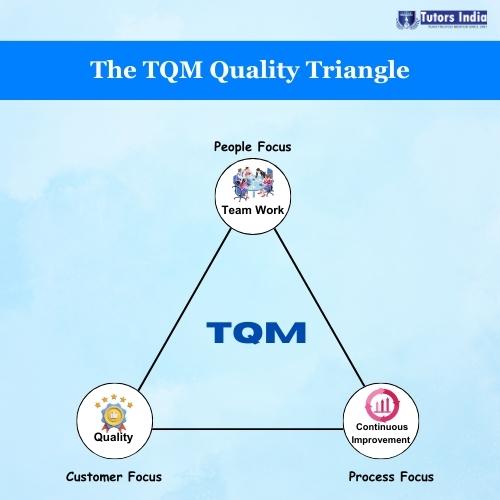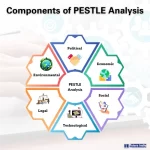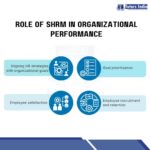TQM-based Human Resource Management Practices- Future Research Directions
Human Resource Management
Human Resource Management (HRM) refers to the process of managing people in organisations. It includes techniques used to manage people and keep them qualified, up-to-date and aligned with the expectations of the stakeholders. Human Resource Management focuses on activities pertaining to professional qualification, learning, and training of individuals. Moreover, outlining the organisational structure, increasing communication, and defining ethical and social standards are also included in Human Resource Management (Da Silva, 2022).
What is Total Quality Management?
Total quality management definition: It refers to the culture, organisation, and attitude of any firm or organisation that seeks to provide these consumers with the necessary products and services that satisfy and fulfil their needs.
The concept of Total Quality Management was introduced as an administrative one that enables every contributor working with the organisation to enhance and improve the corporation’s quality and performance, as well as to develop quality pillars and concepts. This culture necessitates a certain level of quality to be applied and integrated in all phases of operations. (Mohannad Abu Daqar, 2020).
Research on the TQM-HRM relationship
TQM is a comprehensive managerial method that tries to incorporate all organisational processes and functions in order to consistently fulfil customer requests and improve system quality in order to increase profitability and productivity.

TQM can be viewed as a novel management philosophy that improves the overall performance of an organisation. Human resource management practices are crucial for the success of the quality of the products or services provided by an organisation. The incorporation of these practices will increase the quality of the organisation’s system as well as employee performance in the direction of obtaining outstanding status.
TQM necessitates ongoing employee participation. Organisations that want to improve the quality of their services and goods must involve their employees in the process of detecting problems and improving the process of production. The innovative ideas offered by employees should be implemented. Similarly, TQM benefits employees because its adoption promotes personal growth, development, and learning performance (Sawaean, 2020).
Previous research has demonstrated that TQM-based HRM has a positive impact on employee performance and even increases corporate performance. TQM-oriented HRM is important because its implementation benefits the organisation and its employees by increasing customer satisfaction, increasing employee job satisfaction and job-related attitudes, decreasing production costs and increasing productivity, increasing knowledge management efforts, and improving employee performance (Wolor, 2022).
- Check out our dissertation example to know more about the impact of HRM practices on the implementation of TQM.
Future Research Directions
Employing TQM-based practices has positively impacted organisational performance, as stated by previous research. However, some research areas can be explored:
The effect of organisational diversity on Human Resource Management and Total Quality Management
Although a study was done by Baraoun in 2023, it had some limitations, such as a small sample size and the study being restricted to an oil and gas company. Studies with larger sample sizes could be done involving multiple departments that would help generalise the findings.
A study on employee satisfaction under Total Quality Management-based Human Resource Management practices
A study done by Hassan (2023) revealed some limitations like a smaller sample size including only four practices of HRM and five aspects of TQM were evaluated. A study dealing with all HRM practices and Aspects of TQM.
A study on the differences between Hard and Soft Human Resource Management on Total Quality Management
HRM has been classified into two types- hard and soft HRM. Research done by Filippi (2022) analysed the interplay between hard and soft HRM practices for sustaining success for quality. A study could be done on how they are different.
The role of Human Resource Management in change management and Total Quality Management
Research done by Alqudah (2022) revealed that there is a positive association between high- performance HRM practices and readiness to change. A study dealing with the interplay between HRM practices, readiness to change and how it affects TQM could be done.
Conclusion
HRM and TQM have gained attention in many organisations. Total Quality Management (TQM) is a comprehensive managerial technique that aims to address customer needs while also improving system quality and organisational performance. Human resource management (HRM) practices are critical for TQM implementation success by favourably impacting customer happiness, staff well-being, production efficiency, and overall performance. Future research should look into the impact of organisational diversity on HRM and TQM, employee satisfaction with TQM-based HRM, the differences between Hard and Soft HRM on TQM, and HRM’s role in change management. TQM, when paired with efficient HRM, remains a powerful method for achieving and maintaining excellence in today’s fast-paced corporate environment.
Check out our dissertation examples to know more about how dissertations are written in various fields.
About Tutors India
We offer comprehensive dissertation help to master’s students. Our diverse team helps us to cater students specialising in various subject domains. The experts are experienced in research and academic writing and help students at every stage of the dissertation process, from dissertation topic selection, writing a research proposal, and literature review to data collection and statistical analysis. Moreover, we provide dissertation editing that includes technical editing, scientific editing, plagiarism correction service, dissertation peer review, and citation compliance to ensure that error-plagiarism-free, well-structured dissertation aligned with university-specific dissertation guidelines.
References
- Da Silva, L. B. P., Soltovski, R., Pontes, J., Treinta, F. T., Leitão, P., Mosconi, E., … & Yoshino, R. T. (2022). Human resources management 4.0: Literature review and trends. Computers & Industrial Engineering, 168, 108111.
- Mohannad Abu Daqar and Milan Constantinovits (2020). The role of total quality management in enhancing the quality of private healthcare services. Problems and Perspectives in Management, 18(2), 64-78.
- Usrof, H.J., & Elmorsey, R.M. (2016). Relationship between HRM and TQM and its Influence on Organizational Sustainability. International Journal of Academic Research in Accounting, Finance and Management Sciences, 6, 21-33.
- Sawaean, F., & Ali, K. (2020). The mediation effect of TQM practices on the relationship between entrepreneurial leadership and organisational performance of SMEs in Kuwait. Management Science Letters, 10(4), 789-800.
- Wolor, C. W., Musyaffi, A. M., Nurkhin, A., & Tarhan, H. (2022). Employee Perceptions of TQM-Oriented HRM Practices for Perceived Performance Improvement in the Case of Companies in Indonesia. Asian Journal for Public Opinion Research, 10(2), 123–146.
- Baroun, A.E. (2023), “The effects of cross-cultural differences on HRM functions: the case of multinational corporations in Kuwaiti community”, Journal of Enterprising Communities: People and Places in the Global Economy.
- Hassan, L. M. M. and Mohamed, S., B. A. (2023). Examining factors affecting Employee’s Job Satisfaction under the practices of Human Resources Management and Total Quality Management. Case study of Egyptian Petroleum Company, Scientific Journal for Financial and Commercial Studies and Research, Faculty of Commerce, Damietta University, 4(1)1, 229- 267
- Filippi, E., Gaio, L. and Zamarian, M. (2023), “Leveraging the hard and soft elements of TQM: the interplay of benchmarking and improvement processes”, The TQM Journal, Vol. ahead-of-print No. ahead-of-print.
- Alqudah, I. H., Carballo-Penela, A., & Ruzo-Sanmartín, E. (2022). High-performance human resource management practices and readiness for change: An integrative model including affective commitment, employees’ performance, and the moderating role of hierarchy culture. European Research on Management and Business Economics, 28(1), 100177.

 Previous Post
Previous Post Next Post
Next Post